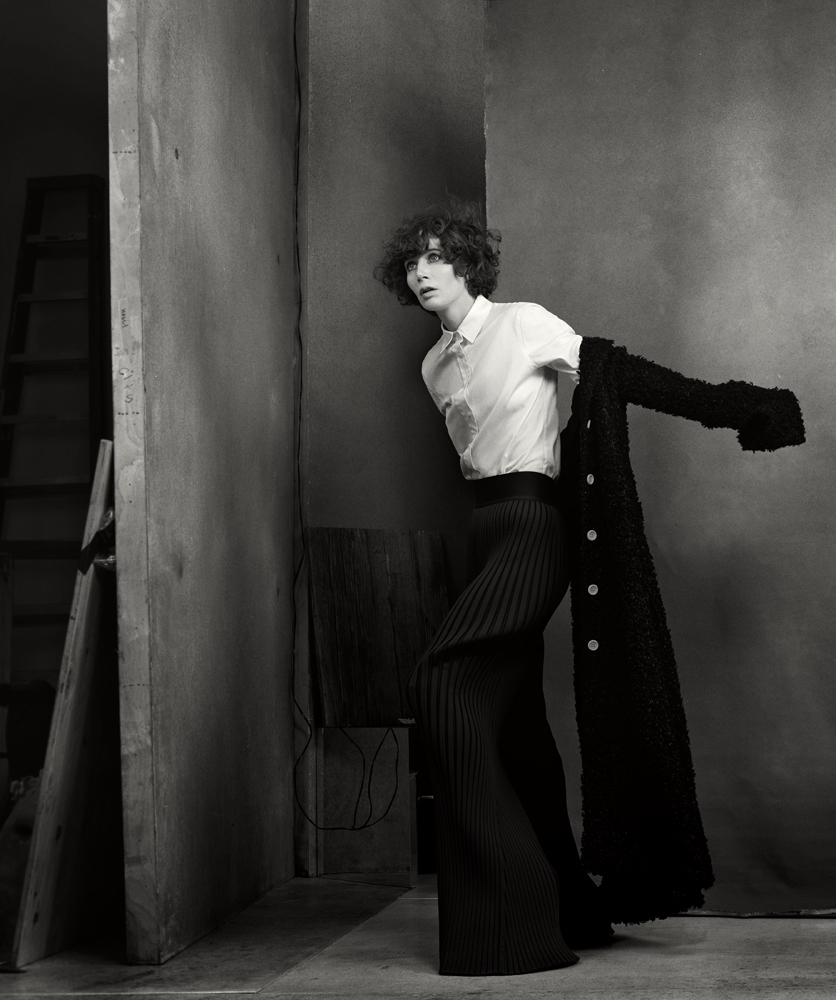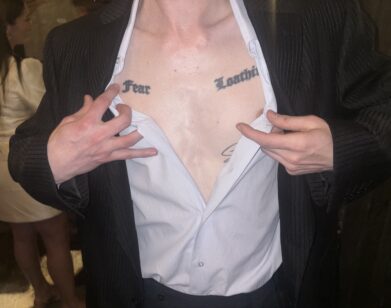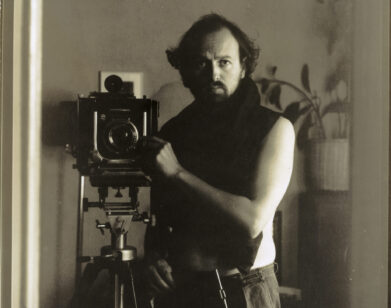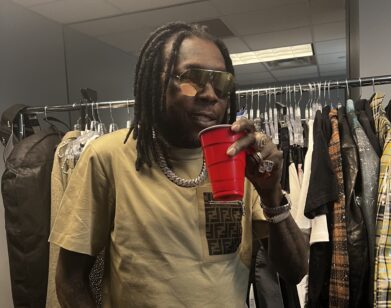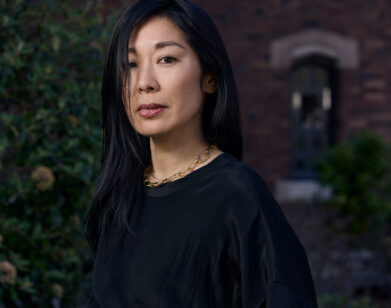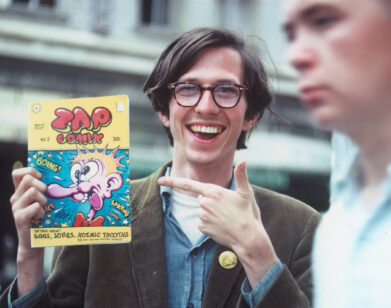Miranda July
Much of the book is about the fantasy world and about how gender is up for grabs in your own secret fantasy life.Miranda July
Depending on how you view Miranda July‘s polymorphic, captain-of-her-own-rocket career, it is either surprising that she hasn’t already published a novel or it’s amazing that she’s tackled yet another genre in her arsenal of artistic achievements. There really is no contemporary predecessor to reach for when assessing the 40-year-old artist’s trajectory—and even in the annals of creative history, only someone like Jean Cocteau comes to mind in terms of wingspan. Among her many roles, July is a filmmaker (Me and You and Everyone We Know, 2005; The Future, 2011); an installation artist; a fiction writer whose 2007 short-story collection, No One Belongs Here More Than You, ranks among the best of the past decade; and last year she even designed her own app, Somebody, that delivers personal messages through a stranger intermediary, which is the perfect distillation of her interest in fusing the foreign and familiar and in turning the human nervous system into a reversible garment so our nerve endings are worn on the outside. The First Bad Man (Scribner) is exactly what happens when you give July nearly 300 pages and a few years (in which time she and her husband, the director Mike Mills, had a son named Hopper) to let her mind explore a longer story. It is risky fiction: hilarious, dark, uncomfortable, and so accurate in mapping the way fantasies can overtake life that it’s also one of the most honest character studies I’ve read in a long time. The narrative revolves around a middle-aged woman, Cheryl, who works at a women’s self-defense league turned fitness-video nonprofit and who, despite her longtime crush on a male colleague, agrees to take in Clee, the young-adult daughter of her employers. It doesn’t take long for the roommate situation to turn into real and simulated forms of violence—the two very different women turning on each other (as well as, during self-defense reenactments and imagined gang-bang scenarios, turning each other on). As the fantasies and dependencies escalate, the characters become more tortured and torturing, and yet, almost miraculously, July manages to keep the readers’ feet planted solidly in her world. With this novel, July might arguably have invented a new subgenre of fiction: the California gothic. (If I had to add a member, Robert Altman’s beautifully twisted tale of morphing identities in his 1977 film 3 Women might make an interesting counterbalance.) When a pregnancy and then an infant are introduced in the second half of the book, imagination and fantasy life are replaced with very real anguish, protection, and love.
July and Carrie Brownstein have known each other for more than two decades—first as teenage pen pals; then actually meeting when Brownstein was touring with her band Excuse 17 while July was in college. The two spoke by phone—July at home in Los Angeles, Brownstein doing press for her band Sleater-Kinney in New York. After 21 years of friendship, they finally got around to describing each other. –Christopher Bollen
CARRIE BROWNSTEIN: I’m going to ask you some basic questions first. I feel like people will want to know some basic information, and I do, too.
MIRANDA JULY: All right.
BROWNSTEIN: You haven’t done a novel before. Was the process different than writing short stories?
JULY: Good question. First off, I was a lot dumber when I was writing the novel. I felt like worse of a writer because I wrote many of the short stories in one sitting or over maybe three days, and they didn’t change that much. There weren’t many, many drafts. That made me feel semi-brilliant and part of a magical process. Writing the novel wasn’t like that. I would come home every day from my office and say, “Well, I still really like the story, I just wish it was better written.” At that point, I didn’t realize I was writing a first draft. And the first draft was the hardest part. From there, it was comparatively easy. It was like I had some Play-Doh to work with and could just keep working with it—doing a million drafts and things changing radically and characters appearing and disappearing and solving mysteries: Why is this thing here? Should I just take that away? And then realizing, no, that is there, in fact, because that is the key to this. I love that sort of detective work, keeping the faith alive until all the questions have been sleuthed out. So, yeah, it was a totally different process. I loved it. I was also pregnant when I wrote the first draft, so it was a little grueling and I just made myself get through it. But after that, it was so much easier than making a movie. Still super-challenging, but not terrifying or painful in the same way.
BROWNSTEIN: Well, that might be because you didn’t have to direct and star in it as well as write it, as you do with your films. What were some of the trickiest parts to sleuth out during the drafts?
JULY: I had a lucky day, when the whole idea came to me at once. I jotted it down, not thinking, “Oh, here’s my novel,” but, “Oh, this could be something.” And for the ending, I had the image of this woman alone with a child. I knew about Clee and Cheryl and their relationship, but I didn’t quite know the steps to get to that final image. First I had to have a baby myself. I remember writing a note in the first draft to my editor, something like, “She has a baby, etcetera, and I’ll know more about this in a few weeks when I give birth and I’ll fill it in then.” And I did know more, but it took me awhile to get back to the world of fiction, to realize that it wasn’t my story that I was writing. I had so much to say as a new mother, but most of it was totally irrelevant to the book. So finding my way to that last scene was tricky. I remember doing a draft of the novel that was almost a thriller; it got really scary. Ultimately the end is my own quiet version of a thriller—a scary near miss. I’m not wanting to give it away but I’m talking about a scene in the end with Phillip.
BROWNSTEIN: There’s something very suspenseful about this book, and there’s also a lot of heightened physical sensations. I can see that thriller aspect to it.
JULY: You and I both read so many things that are truly beautifully written but are not page-turners, and that’s not why we’re reading them. I’m surrounded by books like that, and I’ve been very influenced by them. But a friend sent me this kind of schlocky book called Breed, which is a real thriller and very violent. There are monster parents and stuff. I think my friend sent it because I was on bed rest and I needed something to read. And I liked that feeling of not wanting to put the book down. It’s not that it was badly written; it’s just that it was openly going for a heart-pounding, page-turning sensation. And it took something that extreme for me to notice that writing could have that quality. And in a novel, you have enough time to do that. In a short story, you turn the pages too quickly and it’s over. So weirdly, Breed woke me up to the fact that there needs to be a reason people want to keep going, not just that it’s a lovely told story.
BROWNSTEIN: Who came first in your mind, Clee or Cheryl?
JULY: They came together. Wait, you know the genesis of them because you did a whole Portlandia skit on it. [laughs] I was at a meditation retreat and sitting behind this woman with really short gray hair, and like all of us in the meditation retreat, she was wearing simple black clothes. I became totally infatuated with this butch, older woman. I was having sexual fantasies about her the whole time and waiting for the end, because it was a silent retreat, you couldn’t talk to anyone or even hear what their voice sounded like. Then on the very last day, we all changed into our own clothes, and she changed into her pink sweatshirt with an applique of a bunny on it and got into her minivan with her husband. I was like, oh. I was kind of devastated. There’s a lot more to the Clee/Cheryl relationship than that. But I was kind of satisfied by this memory because it proves this is a real thing—you could make this kind of mistake, especially if you wanted to meet a lesbian. You could misread someone. That was the story I told you that you used for Portlandia, right?
BROWNSTEIN: Yeah. It was completely based on that. I pitched it as an experience that happened to you. It’s that whole idea of creating a fantasy out of somebody’s blankness, or distance, whether the distance is physical or just silence—like that distance between people in a silent meditation. So my character, Sandra, is sort of a meek woman with a lot of wants and unrequited desires. And Fred’s a man sitting across from her in silent meditation, and she begins to have a lot of fantasies about who this person is, and that they were meant to be together. Which is sort of what happened to you. [laughs] The sketch ends with Fred’s character asking the teacher in a real New York accent about money, like, “You know, we pay $40 a session …” And it becomes all the pedestrian qualities of someone crushing the fantasies.
JULY: I’m so satisfied by this. I feel like I haven’t been cashing in on the cred of having inspired a Portlandia skit. That should be the first thing listed on my website.
BROWNSTEIN: Well, that idea of creating a total fantasy world about someone you’ve barely ever talked to is so strong in your character, Cheryl—even with Kubelko [a young child that Cheryl meets as a kid and from then on sees in many other children she comes across], which by the way is one of my favorite names ever. It’s such an imaginary name, like an imaginary friend you make up as a child. Is that the name of someone you actually know?
JULY: There’s a somewhat obscure Austrian artist named Friedl Kubelka-Bondy. I changed that name a little bit. I actually really love her and I loved that name, so it became the baby’s name. People in the art world are going to go, “Wait a second …” But whatever. She’s a cool artist, so people can learn about her. But, yeah, much of the book is about the fantasy world and about how gender is up for grabs in your own secret fantasy life. Like, people who would not be using the word gender or thinking about gayness or trans-ness may actually, without even thinking about it, be not their own gender in their inner world. I think that’s actually so normal, because female sexuality is sold to all of us. It doesn’t just reach the eyes of men. You might not care about the idea of boobs or jugs or whatever, but it could impact your inner sexual life. So I was trying to go as far as I could with exploring that, without ever using the politicizing words that we’re used to. I have a character who wouldn’t know or care about any of those words who is wildly exploring that.
BROWNSTEIN: I think it’s interesting to depoliticize sexuality, because in the real world everything is politicized or has a modifier or signifier. In an interior landscape, or an internal one, though, there is a vastness and a freedom from being married to other people’s judgment. I also think it changes our reading of it because you’re not using the traditional language of sexual perversion or fantasy or some dark vocabulary. When people name these things in real life—these sexual acts or these sexual fantasies—it puts them into a category we can kind of easily understand, whether we like or dislike those things.
JULY: There’s a boundary around them.
BROWNSTEIN: And you’ve created this boundary-less world of want. It makes the book so expansive as an exploration of coming into being.
JULY: That could be the last word on the book right there—and that would be great. The “coming into being” part means a lot to me because, in the world of this book, all of that boundarylessness actually creates a being—a new person, a baby. It’s sort of a weird sleight of hand. Like, obviously there’s only one way babies get made, it takes certain ingredients, but I tried hard to keep that peripheral. The sperm-and-egg thing could be invoked kind of magically or could come into play differently, not just the traditional ways we think of. It’s like when you wake up from a sex dream, and for a little while it really does feel like things are different, like me and that person are married now; I should probably call them. And then the feeling wears off and you’re just like, “Oh, life is normal and I barely even know that person, and I’m so glad I didn’t call.” But Cheryl innocently puts roots down in that land that’s supposed to dissipate as you wake up.
BROWNSTEIN: Right. When we first meet Cheryl, you describe her inner life much more than you describe her physicality.
JULY: It’s funny. It dawned on me when I was editing the book that there were some major characters who I basically didn’t describe at all. In some cases I had to go back and at least give them a hair color or something. Even though I like reading other people’s descriptions of their characters, when I do it, especially when I’m just introducing a character, I start to feel like a seventh-grader writing a story. Like, “She had long, blond hair and her eyes were blue.” Like I’m pretending to be a writer. Because that’s the part you know how to write when you’re younger; plot is a little more up for grabs. So I think now I just cut to the chase, because I want to make sure I can do that. And sometimes the description gets left by the wayside. I know you’ve been working on a memoir. Do you describe all of us in it?
BROWNSTEIN: I think when you’re writing from your own life, it’s hard because you realize that people have their own assessment of how they look, and they don’t know how you will describe them. You can say a friend is attractive or funny, but when it comes to physically describing someone, like their face—
JULY: She was a fat, mean girl. [laughs]
BROWNSTEIN: Yeah, exactly! You realize that you’re actually exposing something about yourself at the same time. It’s tricky. Just like how we are in the real world, you focus on the one little word that feels at fault to you. It could negate the entire story. It could be a section of the book that’s about love or joy or fun, some levity that was never again created, but if you describe somebody in a way that makes them uncomfortable, you feel like you’re tampering with your relationship. But as you were saying about fiction, you have to give people clues.
JULY: You need to let people know that this person looks something like other people you’ve seen.
BROWNSTEIN: I guess people have their imaginations, and of course, writers are counting on their readers to fill in the gaps.
JULY: People tend to hold on to their first impressions—that’s why those first descriptions can be so important. You don’t even necessarily look at people that carefully after a while; you just hold on to that early impression. Like, for you, Carrie, I would say that you have teddy bear eyes: the sweetest dark brown eyes that would be on a bear.
BROWNSTEIN: Like on a teddy bear?
JULY: Like a teddy bear. The rest of you isn’t teddy-bear-like; you’re like a swan. Is that something everyone feels about you?
BROWNSTEIN: All right. I’m okay with that. People have told me that I have sad eyes, but I think the way you’re describing it is you’re ascribing more complexity and nuance to the term sad, because I don’t feel like a sad person.
JULY: No, not sad.
BROWNSTEIN: I think of you as more crane-like. Like a curly headed crane.
JULY: A curly headed crane. Oh God. None of these things are insults but in their specificity, it’s like, “Okay, is that all you see? Teddy bear eyes? A Crane?”
BROWNSTEIN: It’s a distillation. It’s also impressionistic, like a caricature, where you’re thinking, “Is that the feature that is standing out so much that you can’t subtract my teddy bear eyes?”
JULY: [laughs] Totally. And here I thought I was giving you this gift, and, in fact, when you just said crane, at first I thought you were saying cream, and I thought, “Yes! Cream.” Like, peaches and cream, which is the exact opposite of crane, this pointy, crane-y triangle.
BROWNSTEIN: [laughs] Well, I think we should just speak in homonyms then. Or just never describe each other again. You’re like hand cream, so smooth. So we’ll never talk again or describe each other. We’ll send each other selfies.
JULY: Maybe that’s why people take pictures of themselves, to avoid being described.
BROWNSTEIN: We talked about the interior landscape with your book, but there is a lot about the physical, about the body. There’s something so fleshy about the book. And there is a lot of action: kinetic and sometimes violent. You can feel the pain in some of the characters.
JULY: I’ve felt pain. But until you’re feeling it again, it’s not that real, unlike a lot of other memories that you can sort of just conjure up. I remember I was basically done with the book when my son got in this biting stage. Mostly it was all right and he only bit me out of love, I’d like to believe. But one time he bit me so hard. And the minute it happened, I was like, “Oh, okay, that’s pain. I need to go back to my book.” Mike, my husband, was like, “Are you okay? Hopper, you can’t do that, you can’t bite mama.” And I was crying and grinning. And each day when I was writing, it still hurt a little. So I wanted to put that intensity in the book.
BROWNSTEIN: Let’s talk about the title of your book, The First Bad Man. There is a passage in the book where Cheryl imagines reenacting a self-defense video with Clee but not defending herself, and she says the title. Is that where it came from?
JULY: I have a whole deal with titles. I have a file in my computer called “Titles” as you know, because I’ve, in fact, tried to name some of your bands unsuccessfully off my titles list.
BROWNSTEIN: Yeah, you have.
JULY: Lets just say if Wild Flag had been called the First Bad Man, this book would have been called something different. But I think titles are tricky because they’re like a really short ad for the book. And like an ad, they should open the door in a way that might be more accessible than the book itself. So I always like titles to be familiar. I’m not trying to break ground with the title itself. The title should feel like something already celebrated.
BROWNSTEIN: It’s a good title. It already sounds like it belongs.
JULY: But the truth is I get so hung up on titles, but I know they don’t matter. Case in point: Sleater-Kinney. Most random name ever.
BROWNSTEIN: Someone just asked about that today. The truth is, it was arbitrary, and there wasn’t a lot of intention behind it because we didn’t think we were going to be a real band. So we took what we knew. But, of course, people give the words life through their own adoration or relationship to the work, and that’s true of everything. You can’t divorce critical or fan reaction. Once it exists, you forget that the words are arbitrary, or you start to remove value.
JULY: It’s a pretty magical process. I always think Nirvana is a great example of that.
BROWNSTEIN: That is the perfect example, and I think of that, too, because so many bands that were comprised of a couple of sort of hippy guys that smoked a little too much weed and had some blacklight posters in their dorm could have been in a band called Nirvana. There were probably 30 other potential Nirvanas, but at some point in the history of guys getting together to play music—
JULY: Jamming.
BROWNSTEIN: Yeah, jamming. It’s just surprising that we got the Nirvana that we had. How do you feel now that the book is officially done and printed? When did it hit you that it was done?
JULY: I think I knew yesterday when I was finishing recording the audiobook. I started to get a lump in my throat, which Cheryl in the book also gets and which is something we have in common, although mine’s not as bad as hers. But it was bad enough yesterday that I kept having to stop and take deep breaths, because it was kind of strangling my voice. And then it was just taking up too much time, like after every sentence, I was doing some deep breathing meditation alone in the booth, and the guys outside were probably like, “Whoa, what’s going on?” Finally I was like, “Fuck, I am going to have to just cry to get this gone.” I tried to do that really quickly; it’s kind of like trying to secretly have an orgasm without anyone noticing or something. But then I realized that it was getting weird; I needed to just say what was happening. So I came out of the booth and said, “I am crying. I need to do this because I have a lump in my throat, and as you all know from me reading this out loud to you over the last four days, this is called globus hystericus.” And then I just sat and wept. The book was done, and that period of time in which I was writing the book—which I started when I was pregnant and I finished when my son was two—was over. There are never real landmarks in real life—the next thing just comes before you have a moment to see the last thing has ended. So it was a rare moment where there was an end I could be fully conscious of. And it just devastated me. For the past few years, I’ve been pretty internal—in my house, with my family. And now this book will take me back into the world.
BROWNSTEIN: It is so rare, in the moment, to stop or have any sense of ending or closure. You’re right, there is a seamlessness.
JULY: You and I both write alone and we do things with lots of other people—whether it’s a TV show or a movie. What’s that called where it’s the last shot and everyone’s around clapping? The martini shot, right?
BROWNSTEIN: Yeah, the very last shot.
JULY: Yeah. I realized my crying at the recording studio was awesome, because when you’re alone, you don’t really get the martini shot. It’s like, “Woo, martini shot. I guess I’ll check my e-mail.” Maybe I needed the producer and the sound engineer to be there in order to have that. Maybe it’s something that’s hard to do alone, like it’s almost performed, not in a false way but it has to be enacted to be felt at all.
BROWNSTEIN: There is a loneliness to not having someone witness the finality of it. Okay, one last question. You’ve toured with your short stories, and as someone who is a performer and is very good on stage, what is it that you look forward to in terms of sharing the experience of the book with an audience? And how does that differ from when you stage a performance in a theater that’s written for a live audience?
JULY: Well, it’s easy, because you don’t have to memorize it; you just read it and everyone thinks that’s good enough. I will say I tried to read from the novel a few times in the last year as I was writing it, when I had college events, and it’s a lot less fun reading from a novel than a whole short story. It’s like showing an excerpt of a movie rather than a whole episode of a TV show. I learned after the fact that this novel is kind of unexcerptable. It’s hard to isolate scenes. But I’ve got to crack that for all of these readings coming up.
BROWNSTEIN: You could just re-create the self-defense videos.
JULY: Yeah! I could pick one woman from the audience who looks a little like Cheryl and another woman who looks like Clee. I guess that wouldn’t be good, because one person would be less beautiful than the other.
BROWNSTEIN: One thing I was thinking about is Open Palm reminded me so much of Free to Fight back in Portland.
JULY: Oh God, the memories. Luckily, I was removed enough from the whole self-defense movement in Portland that I could kind of pull freely from really vague memories without having any sense of betrayal. Uh oh. I’ve got a boy who’s just come home and is looking for me in the house and hasn’t found me yet. It’s just a matter of seconds.
CARRIE BROWNSTEIN IS AN ACTRESS AND MUSICIAN. IN JANUARY, HER SHOW PORTLANDIA DEBUTED ITS FIFTH SEASON AND HER BAND SLEATER-KINNEY RELEASED NO CITIES TO LOVE.

